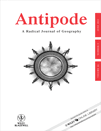
ANTIPODE
Scope & Guideline
Fostering Innovative Research in Social and Environmental Interactions
Introduction
Aims and Scopes
- Critical Geography:
ANTIPODE emphasizes critical approaches to geography, examining how spatial practices shape and are shaped by power relations, social justice, and environmental concerns. - Social Reproduction and Activism:
The journal frequently explores themes of social reproduction, activism, and resistance, highlighting the struggles of marginalized communities against systemic injustices. - Environmental Justice and Political Ecology:
Research on environmental justice and the political ecology of space is central to the journal's scope, addressing the impacts of capitalism and colonialism on ecosystems and communities. - Intersectionality and Identity Politics:
ANTIPODE engages with intersectional analyses, investigating how race, gender, class, and other identities influence spatial relations and experiences. - Urban Studies and Spatial Politics:
The journal focuses on urban studies, particularly the politics of space in cities, addressing issues of gentrification, housing, and community organizing. - Decolonial Perspectives:
A unique contribution of ANTIPODE is its commitment to decolonial thought, challenging hegemonic narratives and advocating for Indigenous perspectives and practices.
Trending and Emerging
- Racial Capitalism:
An increasing number of papers are exploring the concept of racial capitalism, examining how race intersects with economic systems and contributes to social inequalities. - Decolonial and Indigenous Frameworks:
There is a growing emphasis on decolonial perspectives, with research focusing on Indigenous rights, land sovereignty, and the impacts of colonialism on contemporary geographical practices. - Social Movements and Resistance:
ANTIPODE is highlighting the role of social movements and grassroots activism, particularly in urban contexts, as vital in combating systemic oppression and advocating for social change. - Climate Justice and Environmental Racism:
Research addressing climate justice, particularly the disproportionate impacts of environmental degradation on marginalized communities, is gaining traction within the journal. - Digital Geographies and Surveillance:
The exploration of digital geographies, including the implications of surveillance technologies and data politics, is emerging as a critical area of study. - Care and Social Reproduction:
Papers focusing on care work, social reproduction, and their relation to economic systems are increasingly prominent, reflecting a broader understanding of labor and value in society.
Declining or Waning
- Traditional Urban Planning:
Discussions centered around conventional urban planning methodologies are less frequent, as the journal shifts towards more radical and critical approaches to urbanism. - Economic Growth Paradigms:
There is a noticeable decline in research focused on traditional economic growth models, as ANTIPODE increasingly critiques neoliberal economic frameworks and their social implications. - Nationalism and Sovereignty:
Themes related to nationalism and state sovereignty are becoming less prominent, as the journal emphasizes transnationalism and global interconnectedness. - Conventional Environmentalism:
Research that aligns with mainstream environmentalism, which often overlooks systemic injustices, is waning in favor of more radical ecological perspectives that highlight social and racial justice. - Rural Studies:
Papers focusing on rural geography and issues specific to rural communities have decreased, reflecting a shift towards urban-centric research that addresses the complexities of metropolitan areas.
Similar Journals
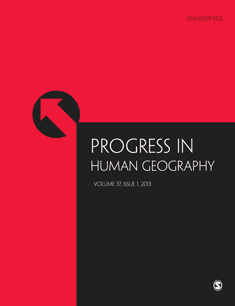
PROGRESS IN HUMAN GEOGRAPHY
Shaping the Future of Geographic ThoughtPROGRESS IN HUMAN GEOGRAPHY is a leading journal dedicated to advancing the field of human geography, published by SAGE PUBLICATIONS LTD in the United Kingdom. With a strong impact factor and ranked in the Q1 category for Geography, Planning and Development in 2023, this journal stands out as a critical platform for publishing original research that shapes contemporary geographic thought. Established in 1977, it continues to present pioneering studies and theoretical developments that address pressing social and environmental issues. The journal's prominence is evidenced by its impressive Scopus rank of 10 out of 821 in the field, placing it in the top 2% of social sciences journals. While it does not currently offer Open Access options, PROGRESS IN HUMAN GEOGRAPHY remains committed to providing high-quality academic discourse that not only informs but also inspires future geographical research. Researchers, professionals, and students alike will find this journal to be an essential resource for insights and advancements in the dynamic landscape of human geography.
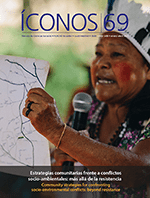
Iconos
Exploring Socio-Cultural Dynamics Through Rigorous ScholarshipIconos is a distinguished academic journal published by FAC LATINOAMERICANA CIENCIAS SOCIALES-FLACSO in Ecuador, with an ISSN of 1390-1249 and an E-ISSN of 1390-8065. Since its inception in 1997, Iconos has proudly maintained an open-access policy, promoting accessibility and dissemination of critical research across various disciplines. With a strong focus on Anthropology, Gender Studies, and Social Sciences, this journal has achieved a commendable standing, being categorized in the Q2 quartile in 2023 across multiple categories in these fields. Notably, it ranks #199 in Anthropology and #91 in Gender Studies, placing it in the upper percentiles of academic publishing. The journal aims to foster interdisciplinary dialogue and to illuminate socio-cultural dynamics through rigorous scholarship. With its commitment to quality, research diversity, and social relevance, Iconos serves as an essential resource for researchers, professionals, and students alike, seeking to engage with contemporary social issues from a Latin American perspective.

Gender Place and Culture
Illuminating the Connections Between Identity and PlaceGender, Place and Culture is a leading international journal published by Routledge Journals, Taylor & Francis Ltd, dedicated to advancing knowledge and understanding in the fields of Gender Studies, Cultural Studies, and related disciplines. Since its inception in 1994, this esteemed publication has become a critical resource for researchers, professionals, and students seeking to explore the intricate relationships between gender, identity, and spatial dynamics. With a commendable impact factor and prestigious rankings placing it in the Q1 quartile for Arts and Humanities (miscellaneous), Cultural Studies, and Gender Studies, the journal not only underscores its significance within academia but also reflects its commitment to high-quality scholarship. The editorial team actively promotes rigorous research that addresses contemporary societal issues, fostering an inclusive scholarly discourse. Researchers interested in contributing to this dynamic field will find Gender, Place and Culture an invaluable platform for sharing innovative ideas and findings, contributing to the ongoing conversation around the complex interplay of gender and space.
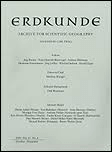
Erdkunde
Connecting Earth Sciences with Ecological PerspectivesErdkunde is a pivotal academic journal published by the Geographisches Institut, University of Bonn, dedicated to the fields of Geography, Earth and Planetary Sciences, and Ecology. With a history dating back to 1976, this journal serves as a platform for interdisciplinary research and discourse, reflecting diverse perspectives from both theoretical and applied dimensions within these domains. Published in Germany, it currently holds a respectable position within the academic community, classified in Q2 for Geography, Planning and Development and Q3 in Ecology and Earth and Planetary Sciences. Although not an open-access journal, its contribution is significant, offering insights that advance our understanding of spatial dynamics and environmental processes. With Scopus rankings that place it within the median range, Erdkunde is an essential resource for researchers, professionals, and students looking to deepen their knowledge and engage with contemporary trends in geographic research.
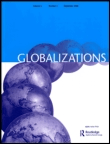
Globalizations
Advancing knowledge on the dynamics of a globalized world.Globalizations is an esteemed academic journal published by Routledge Journals, Taylor & Francis Ltd, dedicated to the interdisciplinary exploration of globalization phenomena. With ISSN 1474-7731 and E-ISSN 1474-774X, this journal features thought-provoking articles that analyze economic, sociopolitical, and environmental dimensions of globalization. Renowned for its high academic standards, it ranks in the Q1 Quartile across multiple categories including Economics, Geography, and Sociology, reflecting its significant impact in these fields. As of 2023, it is recognized in the top echelons of academic research, holding positions within the 90th percentile in several disciplines. Globalizations operates without an open access model, ensuring the integrity and quality of its curated content, making it an indispensable resource for researchers, professionals, and students eager to deepen their understanding of global processes and their implications. With a publication timeline extending from 2004 to 2024, the journal remains a pivotal platform for new insights and critical discussions surrounding globalization.
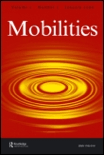
Mobilities
Exploring the Dynamics of Movement in SocietyMobilities is a premier scholarly journal published by Routledge Journals, Taylor & Francis Ltd, delving into the multifaceted dimensions of mobility across various disciplines. With an ISSN of 1745-0101 and an E-ISSN of 1745-011X, this esteemed journal plays a pivotal role in advancing knowledge and understanding in fields such as Demography, Geography, Planning and Development, and Sociology. Routinely recognized for its high-quality research, Mobilities boasts an impressive Q1 ranking across these categories in 2023, underscoring its significance in the academic landscape and reflecting its impact factor within the academic community. Though it operates under a subscription model, the journal prioritizes accessibility to cutting-edge research and theoretical debates that explore the critical roles of movement and mobilities in shaping societies and environments. Whether you are a researcher, professional, or student, Mobilities provides a vital platform for engagement with contemporary issues related to mobility, making it an essential resource for anyone seeking to contribute to or understand the dynamics of mobility in today’s world.
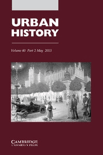
Urban History
Interdisciplinary Perspectives on Urban TransformationsUrban History, published by Cambridge University Press, is a leading journal dedicated to the interdisciplinary study of urban development and historical transformations within cities. Since its inception in 1974, the journal has established a reputable platform for innovative research, contributing significantly to the fields of History, Geography, and Urban Studies. Notable for its impressive ranking in the Q1 category in History and Q2 in both Arts and Humanities and Geography, Planning and Development, Urban History serves as an essential resource for researchers, professionals, and students alike, emphasizing the intricate relationships between urban spaces and historical narratives. With an ongoing commitment to academic excellence, the journal offers high-quality peer-reviewed articles that explore diverse themes related to urbanization, community dynamics, and the socio-political factors shaping modern cities, providing valuable insights for contemporary urban scholarship.
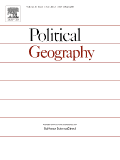
POLITICAL GEOGRAPHY
Exploring the Nexus of Space and PowerPOLITICAL GEOGRAPHY is a leading journal published by Elsevier Sci Ltd, a prestigious name in academic publishing, committed to advancing knowledge in the fields of geography, planning and development, history, sociology, and political science. With an impressive impact factor reflected in its Q1 ranking across multiple disciplines including Geography and Planning and Development, this journal stands at the forefront of interdisciplinary research, exploring the complex interplay between geopolitics, social structures, and spatial dimensions. The journal, with ISSN 0962-6298 and E-ISSN 1873-5096, provides a platform for rigorous empirical research and theoretical advancements, making it essential reading for scholars, practitioners, and students aiming to engage deeply with contemporary political and geographic issues. As it converges research from its inception in 1983, POLITICAL GEOGRAPHY continues to influence discussions and drive innovations within its field, thus solidifying its role as a vital resource for advancing understanding of the spatial aspects of political phenomena.
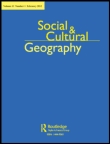
SOCIAL & CULTURAL GEOGRAPHY
Unveiling the dynamics of culture through geography.SOCIAL & CULTURAL GEOGRAPHY, published by Routledge Journals, Taylor & Francis Ltd, stands as a leading platform for innovative research in the fields of cultural studies and geography. With an impressive impact factor reflected in its Q1 ranking in both Cultural Studies and Geography, Planning and Development categories, this journal houses high-quality articles and theoretical frameworks that shape contemporary discussions in social and cultural geography. Its rigorous indexing, including a commendable Scopus Rank—#20 out of 1304 in Cultural Studies—underscores its significance and influence in the academic community. Operating since 2000 and continuing to thrive until 2024, SOCIAL & CULTURAL GEOGRAPHY promotes interdisciplinary dialogues while fostering a deeper understanding of the intricate relationships between society and space. We encourage researchers, professionals, and students to engage with resourceful insights and critical perspectives published in this pivotal journal, thereby contributing to the evolving landscape of geographical thought.
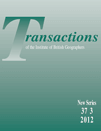
TRANSACTIONS OF THE INSTITUTE OF BRITISH GEOGRAPHERS
Shaping Contemporary Geography Through Rigorous ScholarshipTRANSACTIONS OF THE INSTITUTE OF BRITISH GEOGRAPHERS is a prestigious journal published by Wiley, focusing on the dynamic field of geography and its multifaceted interactions with earth-surface processes. With an ISSN of 0020-2754 and an E-ISSN of 1475-5661, this journal has made significant contributions to the discipline since its inception in 1976, continuing to publish groundbreaking research that shapes contemporary geographical thought until 2024. Recognized for its rigorous scholarship, it is classified within the top quartile (Q1) of both the Earth-Surface Processes and Geography, Planning and Development categories. The journal holds respectable rankings in Scopus—91st out of 821 in Social Sciences and 22nd out of 179 in Earth and Planetary Sciences—placing it in the 88th and 87th percentiles, respectively. Although it operates under traditional access policies, the depth of research, variety of topics, and the interdisciplinary approach make it an invaluable resource for researchers, professionals, and students alike, promoting a deeper understanding of spatial dynamics and planning within our rapidly changing world.